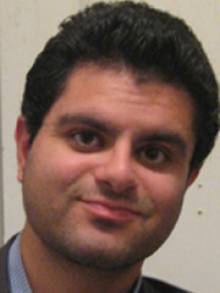Jacob Victory
MPA in Health Policy & Management
-
1998

Earlier in his career Jacob Victory told Idealist.org in an interview, "There is a lack of planning in healthcare to address the awesome needs of the population. The industry is more reactive than proactive." As a strong strategic planner, Victory has spent most of his professional life working to fill that gap at the organizations where he has worked. Reflecting more recently on his career, he says that one thing he learned at Wagner that has served him well is how to "think differently [and] approach issues from a different angle."
Victory's first job out of school was as a Planning Associate at Cabrini Medical Center. He ended up on a fast track soon thereafter when the COO left Cabrini and most of his staff followed suit. Victory rose to Senior Planning Associate and eventually became the Acting Director of the Strategic Planning Department, reporting directly to the CEO and managing several external planners and consultants. In that role, Victory noticed that a large portion of the elderly population that Cabrini served had Alzheimer's and dementia so he developed an inpatient Alzheimer's unit focused on family caregivers- the first of its kind in the nation.
After moving on from Cabrini and spending two years as a Planner at New York Presbyterian Hospital, Victory became the Project Manager to the CEO at Visiting Nurse Service of New York (VNSNY). In that position he oversaw corporate strategic planning initiatives and served as the CEO's liaison to the executive staff. The broad exposure to the organization and high visibility that the role gave him prepared him well for his subsequent positions at VNSNY. After five years in the executive office, he became Director of Operations for Rehabilitation Services and was later promoted to Director of Operational Performance Management, Specialized Services. Currently, he is the Administrator for Children and Family Services and is responsible for the largest pediatric home care program in the country.
Victory oversees six clinical pediatric programs that serve over 10,000 children annually. Services offered by his department range from short-term, acute care to service for children with chronic illnesses or medically complex cases. VNSNY's Maternity, Newborn, and Pediatrics division was the first program that the organization initiated - one hundred and sixteen years ago - and other pediatric programs have been added, like programs that promote preventive health services such as Early Head Start, two programs focused on fathers, Early Intervention, and an evidence-based Nurse Family Partnership program. While overseeing the operations and strategic growth of these programs, Victory is also developing two brand new initiatives. One is a diabetes care management program for adolescents and the other is a pediatric palliative care program in partnership with VNSNY Hospice Care. Victory explains that once the palliative care program is running, VNSNY's "pediatric division will serve children at stages from pre-birth to end-of-life."
"I really love to create things," says Victory, an avid painter in his free-time (his abstract portraits have been on display at Wagner's Gallery). So it is fulfilling for him to have "two programs in development that are both meeting unmet needs." He points out that currently less than 1% of kids who need hospice-type services or pain management care receive it. VNSNY is working to meet that need. Nevertheless, the work is not without its challenges. "Over 95% of the populations we serve are on Medicaid or Medicaid managed care," Victory says. "These kids lack a medical home or a standard physician, and we fill that gap." But because reimbursement for treating young people is very low, the question becomes "how to provide care efficiently under so many reimbursement constraints," he explains. Victory monitors twenty-five clinical and business indicators and makes strategic decisions to ensure things are as efficient as possible. He often wishes the greater healthcare sector would move in this direction as well.
When you look at "healthcare reform today", he says, "it's all about reimbursements. No one is talking about how care is delivered. I'm focused on care delivery." He explains that in his view, the key ways "to change healthcare is through evidence-based care delivery models - linking the medical outcome with the value you're getting, and through management efficiencies." Victory believes the healthcare world must "do these first and then talk about reimbursing providers."
Although Victory thinks differently about healthcare than many, he takes his work in stride. The most important thing he says, is to "stay calm. Healthcare is tied to a lot of regulations," he explains. "A lot of what we do depends on the government and guidelines and budgets are always changing. Thus, a lot of strain is put on our field." Staying calm allows you to "make better decisions" over the long run.
Continuing in his proactive vein, Victory may work to influence government regulations in the future. "Healthcare policy fascinates me," he says. "I would love to eventually work in health law or health policy to create care delivery models that are tied to the appropriate reimbursement mechanisms, or perhaps work on the managed care side." Whatever type of work the future holds for him, Victory is sure to approach it with fresh, strategic perspectives.